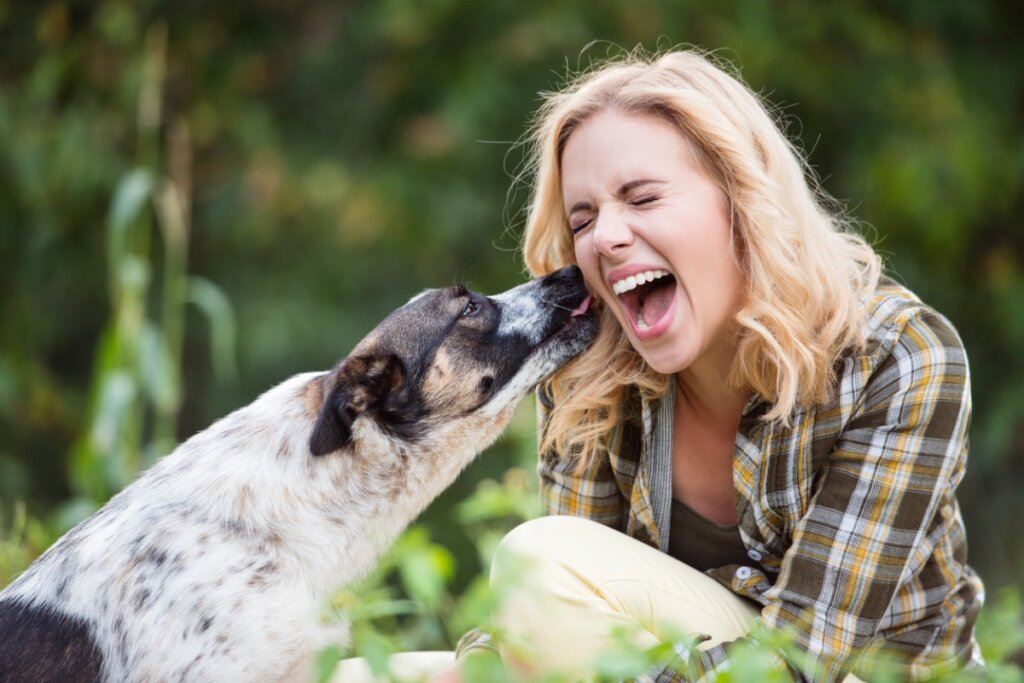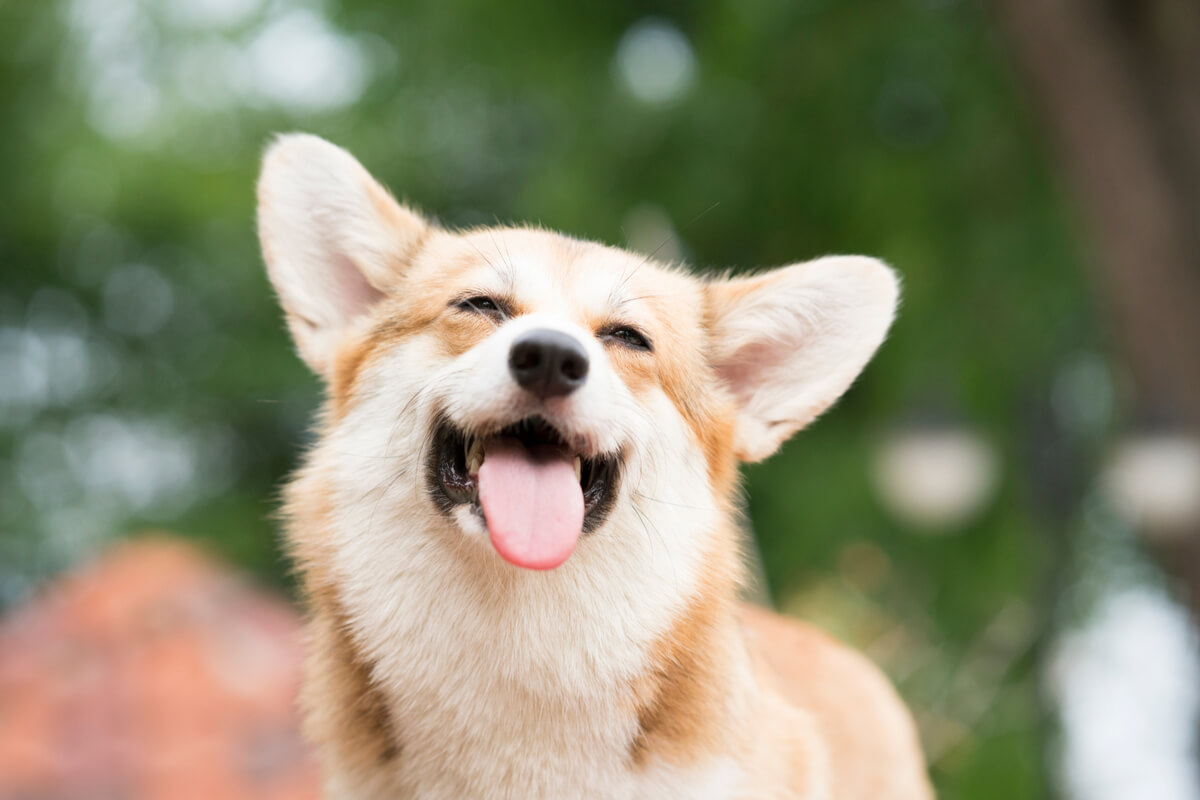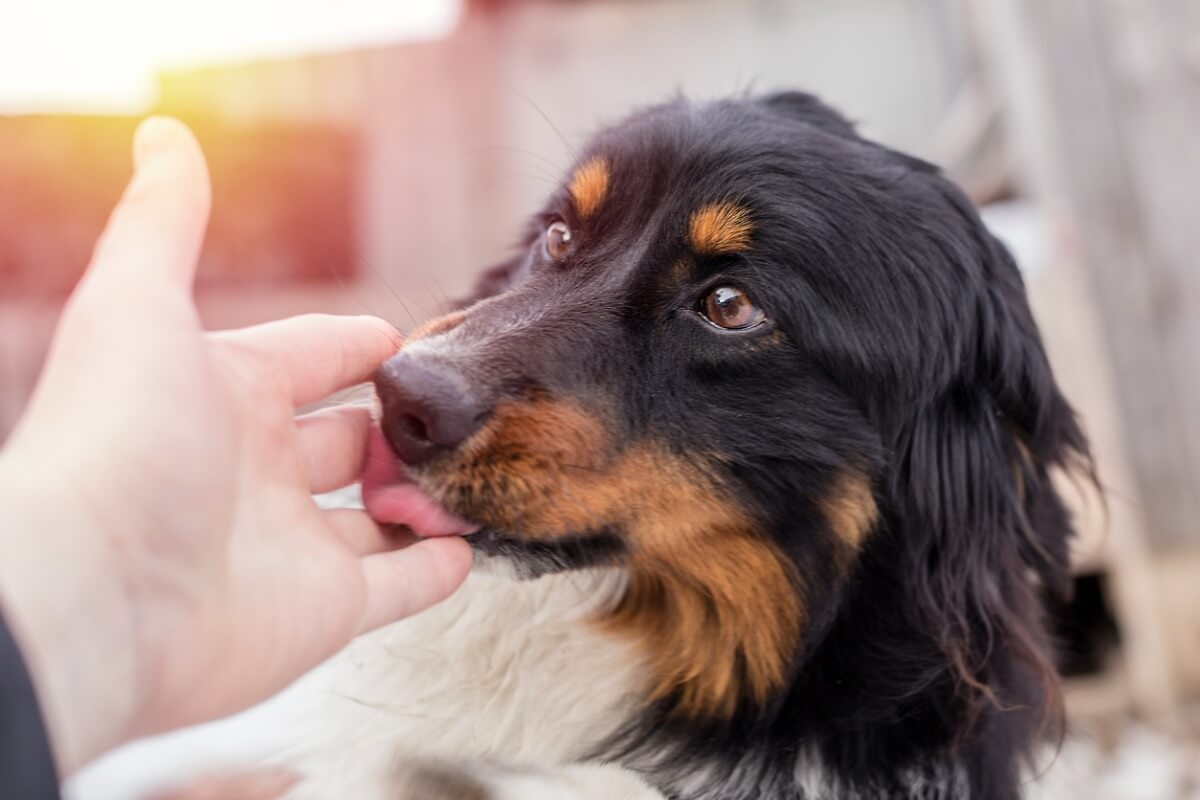7 Reasons Why Your Dog Licks You

Any dog owner will know that dogs love to lick, whether it’s themselves, their owner, or anyone who inspires a modicum of trust. This primal gesture is hardwired into dogs’ genetic code and we always interpret it as a mechanism of bonding and affection. Even so, the reasons why a dog licks you can go beyond love.
We must never fall into the error of humanizing our pets, no matter how much we adore them. For example, the fact that we want to interpret licking as a gesture of love in all cases doesn’t mean that the dog always transmits this feeling with the act of licking. Here are 7 reasons why your dog licks you!
7 reasons why your dog licks you a lot
Saliva is essential in the canine world to carry out various processes. It doesn’t only help the formation of the food bolus during the digestive mechanism, but it’s also a way to establish sociality between dogs and even seems to help healing. Professional sources estimate that this liquid has bactericidal substances, for example.
The use of this fluid is more than proven between members of the same species, but why does your dog lick you – their owner – so much? Here are 7 reasons why.

1. Affection
Undoubtedly, affection and love are the main reasons that trigger licking in dogs. This behavior is embedded in their genome, as females begin to lick their pups from birth in order to create a strong bond with them. They also do this to stimulate intestinal motility (so that puppies begin to defecate) and to cleanse their bodies of impurities.
The simplest answer to the question at hand is that your dog licks you because they love you and want to show how strong your bond is. Although this isn’t similar to the maternal licking already discussed, the premise is somewhat similar: your dog cares for you and adores you just as they would their children in their natural environment.
Licking is a social act that begins at birth. Sometimes the puppies themselves lick their mother’s mouth to get her to regurgitate food.
2. Attention seeking
Licking is hardwired into the canine instinct, but owners encourage it with their responses. A human hardly ever sits still when their face is being licked (laughing, pulling away, fussing, or petting the dog back), so the dog interprets the act as a perfect way to get attention.
Even negative reinforcement can even make your dog lick you when you don’t want them to. Pushing him gently, saying “NO!” or changing body position is still counted as attention and the dog usually interprets it all as play. Therefore, they’ll lick you (whether you like it or not) when they want you to pay attention to them.
3. Instinct
As we’ve already mentioned, the mother licks her offspring to groom them and to favor their intestinal motility. On the other hand, the offspring of many canids (family Canidae) incessantly lick their parents’ mouths to regurgitate food in the natural environment. As you can imagine, domestic dogs have inherited some of these behavior patterns.
It can be postulated that licking is an instinctive act encoded in the canine genome, but this isn’t always easy to prove. Above all, you must take into account that dogs have been artificially bred for centuries, which greatly dilutes their instincts.
4. You smell or taste good
Dogs contain about 1700 taste buds spread across their tongue, each with 50 taste receptors. The sense of taste is very important to them and they’ll try to identify something they have smelt with the help of their tongue. For this reason, one of the reasons why your dog licks you (especially your face) is that you have eaten something tasty or you smell good to them!
5. Stress
Some captive animals develop problematic behavior patterns known as stereotypies. These are actions that they carry out on a recurring basis for no specific biological reason, due to stress, anxiety, poor care, and lack of stimulation. Licking can become a stereotypy if it’s done constantly (either directed towards the owner or the dog’s own body).
Some dogs can even injure themselves by excessive licking during times of anxiety and stress.
6. Sense of security
A dog may lick its owner for the same reason it licks its mother’s body when it’s a puppy. This is nothing more than a reassurance to him that all is well and that their reference figure is still by their side.
7. Emotional disorders
Although not common, some dogs can suffer from obsessive-compulsive disorders (OCD). These usually manifest with signs such as constant tail-chasing, mindless circling, eating inedible substances, endless jerky actions, and much more.
If your dog licks you when they want to show affection, this is normal, but you should be suspicious if they’re looking for affection at all times of the day. It’s also a sign that something is wrong when he licks surfaces, the floor, and your body, even to the point of hurting themself.
How to stop your dog from constantly licking you
The reasons your dog licks you are almost always endearing ones. However, this doesn’t mean you have to put up with constant licking when you don’t want it. The secret to prevent this behaviour from becoming chronic in your dog is to stop paying attention to them when they do it.
If your dog licks you excessively, don’t respond, don’t push them, don’t play with them and don’t say anything to them. Move your face, turn around and, if necessary, leave the room. When the dog understands the message and stops the licking, then give them a treat and pet them. Ideally, they’ll link the action of not licking with the attention you give him afterwards.
Learning should always be positive. Don’t punish your dog if they do something wrong – reward them when they stop doing it.

Your dog licks you for many reasons, but almost all of them are instinctive and positive. However, excessive licking can become chronic and indicate an ethological problem in the dog, such as stress, anxiety, or compulsive behavior. If you can’t stop this behavior on your own, don’t hesitate to see a veterinarian and an animal behaviorist.
All cited sources were thoroughly reviewed by our team to ensure their quality, reliability, currency, and validity. The bibliography of this article was considered reliable and of academic or scientific accuracy.
- Should Dogs Lick Wounds To Heal Them? AKC. Recogido a 15 de noviembre en https://www.akc.org/expert-advice/health/should-dogs-lick-wounds/
- Why is my dog licking me? AKC. Recogido a 15 de noviembre en https://www.akc.org/expert-advice/advice/why-is-my-dog-licking-me/
